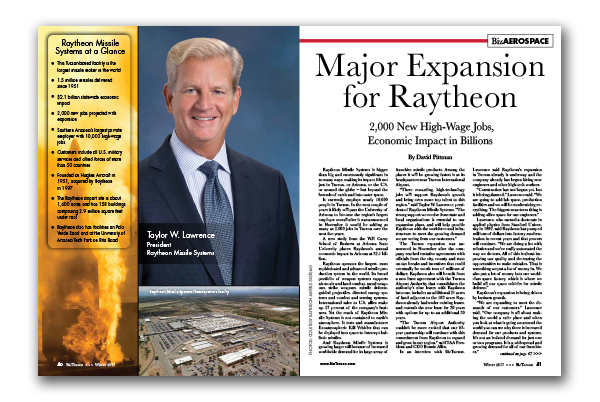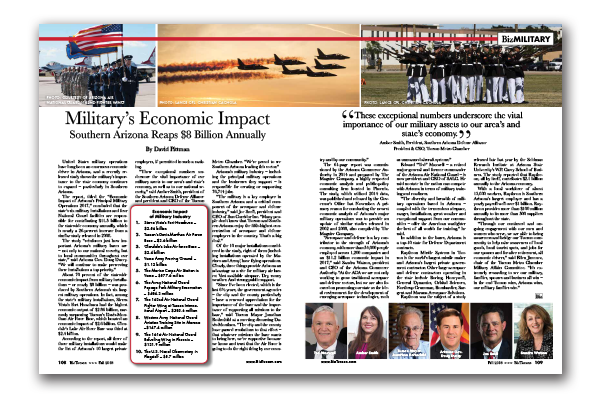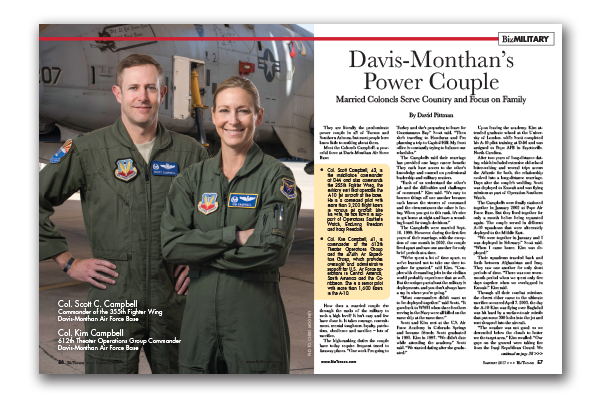
Major Expansion for Raytheon
By David Pittman –
2,000 New High-Wage Jobs, Economic Impact in Billions
Raytheon Missile Systems is bigger than big and enormously significant in so many ways, making its impact felt not just in Tucson, or Arizona, or the U.S. or around the globe – but beyond the bounds of earth and into outer space.
It currently employs nearly 10,000 people in Tucson. In the next couple of years it likely will pass the University of Arizona to become the region’s largest employer overall after it was announced in November it would be adding as many as 2,000 jobs in Tucson over the next five years.
A new study from the W.P. Carey School of Business at Arizona State University places Raytheon’s annual economic impact in Arizona at $2.1 billion.
Raytheon operates the largest, most sophisticated and advanced missile production system in the world. Its broad portfolio of weapon systems supports air-to-air and land combat, naval weapons, strike weapons, missile defense, guided projectiles, directed energy systems and combat and sensing systems. International sales to U.S. allies make up 27 percent of the company’s business. Yet the reach of Raytheon Missile Systems is not contained to earth’s atmosphere. It tests and manufactures Exoatmospheric Kill Vehicles that can be deployed into space to intercept ballistic missiles.
And Raytheon Missile Systems is growing larger still because of increased worldwide demand for its large array of franchise missile products. Among the places it will be growing fastest is at its headquarters near Tucson International Airport.
“These rewarding, high-technology jobs will support Raytheon’s growth and bring even more top talent to this region,” said Taylor W. Lawrence, president of Raytheon Missile Systems. “The strong support we receive from state and local organizations is essential to our expansion plans, and will help provide Raytheon with the workforce and infrastructure to meet the growing demand we are seeing from our customers.”
The Tucson expansion was announced in November after the company reached tentative agreements with officials from the city, county and state on tax breaks and incentives that could eventually be worth tens of millions of dollars. Raytheon also will benefit from a new lease agreement with the Tucson Airport Authority that consolidates the authority’s nine leases with Raytheon into one, includes an additional 21 acres of land adjacent to the 183 acres Raytheon already had under existing leases, and extends the new lease for 30 years with options for up to an additional 30 years.
“The Tucson Airport Authority couldn’t be more excited that our 65-year partnership will continue with this commitment from Raytheon to expand and grow in our region,” said TAA President and CEO Bonnie Allin.
In an interview with BizTucson, Lawrence said Raytheon’s expansion in Tucson already is underway and the company already has begun hiring new engineers and other high-tech workers.
“Construction has not begun yet, but it is being planned,” Lawrence said. “We are going to add lab space, production facilities and we will be modernizing everything. The biggest near-term thing is adding office space for our engineers.”
Lawrence, who earned a doctorate in applied physics from Stanford University in 1992, said Raytheon has pumped millions of dollars into factory modernization in recent years and that process will continue. “We are doing a lot with robotics and we’ve really automated the way we do tests. All of this is about improving our quality and decreasing the opportunities to make mistakes. That is something we put a lot of money in. We also put a lot of money into our world-class space factory, which is where we build all our space vehicles for missile defense.”
Raytheon’s expansion is being driven by business growth.
“We are expanding to meet the demands of our customers,” Lawrence said. “Our company is all about making the world a safer place and when you look at what is going on around the world you can see why there is increased demand for our products and systems. It’s not an isolated demand for just one or two programs. It is a widespread and growing demand for all of our franchises.”
Raytheon’s decision to expand its Tucson operations comes on the heels of a number of recent and high-profile company relocations and expansions in Tucson. The success seen during the past year in attracting these companies is being viewed by many in the community as positive evidence that state, county and city governments, along with local business interests and quasi-governmental operations, are united and working collaboratively to bolster job creation and economic growth.
Such views are a turnabout in Tucson, which has been a place where complaints of local government indifference to the plight of private business have been commonplace for decades.
One of the lowest points in the history of economic development in the Old Pueblo came in 2010 when Raytheon Missile Systems selected Huntsville, Alabama, over Tucson as the site of a new manufacturing facility to integrate the company’s largest missiles, the Standard Missile-3 and the Standard Missile-6. Tucson was beaten by Huntsville for two reasons. First, it was unable to match the incentive package offered by the Alabama city. And secondly, though Raytheon’s Tucson headquarters had enough buffer space around its facility to test smaller missiles, it did not have the buffer area needed to test the larger ones.
The failure to land the Raytheon integration facility was a huge wake-up call that led many Southern Arizona government, political and business leaders to re-examine the community’s economic development programs to determine what had gone wrong and how things could be set right.
That process got underway when Joe Snell, president and CEO of Sun Corridor Inc., led a group of 12 business and government leaders to Huntsville to find out firsthand what that community was doing to attract high-tech defense companies and manufacturers that Tucson was not. What the contingent witnessed in Huntsville was a unified local populace that supported pro-business policies aimed
at attracting high-wage jobs, an active and vocal Congressional delegation that worked to bring
private- and public-sector job opportunities to
Alabama, and a city government that had enacted a sales tax to pay for high-tech infrastructure and a world-class business park designed to attract high-tech defense and manufacturing companies.
The Huntsville trip proved to be a turning point for Pima County Administrator Chuck Huckelberry.
“After the site visit, it was clear that Pima County and our region needed to take an entirely different approach to economic development other than hoping our favorable climate would give us a competitive edge,” Huckelberry said. “This meant significantly increased regional collaboration among governmental entities, increased infrastructure investments, and proactive advanced planning to ensure the region never again lost an opportunity to help the largest private sector employer in the region to expand.”
Implementation of that vision began in earnest in March 2012 with Pima County’s $5.9 million purchase of 382 acres of private land south of the airport. The purchase prevented urban encroachment around Raytheon Missile Systems’ headquarters facility, and provided the land needed to relocate Hughes Access Road, now known as Aerospace Parkway.
Construction of Aerospace Parkway was completed in December 2015. Realignment of the road made way for the buffer area Raytheon needed for expansion and provided the ability to begin planning and installing the needed infrastructure for development of the Pima County Aerospace, Defense and Technology Research and Business Park, which already counts World View Enterprises and Vector Space Systems as future tenants.
Huckelberry has also indicated the proposed Sonoran Corridor, a road project that was defeated by county voters in a bond election in November 2015, could be resurrected because of its new listing as a federal government priority, which increases the possibility that substantial federal funds could be dedicated to the project. If built, the corridor would connect Interstate 10 at Rita Road with Interstate 19 north of Pima Mine Road.
Lawrence said Huckleberry’s efforts were critical to Raytheon’s decision to expand in Tucson. “The county, and specifically Chuck Huckelberry and his initiatives regarding the Aerospace Parkway and the Sonoran Corridor, have been great and are already attracting other high-tech companies,” he said. “Bringing other high-tech companies into the region was certainly a positive factor in our decision to grow here.”
Huckelberry wasn’t the only person credited by Lawrence, who also praised Gov. Doug Ducey, U.S. Sen. John McCain, Congresswoman Martha McSally, Tucson Mayor Jonathan Rothschild and officials from Sun Corridor and Tucson Airport Authority for assisting Raytheon’s planned expansion.
“It is the integration of the various levels of government working together that is responsible for achieving a more pro-business result than in the past,” Lawrence said. “All levels of government came together and really examined what we needed as far as overall incentives.”
Snell said Tucson and Pima County are “in a good place right now” in their economic development efforts.
“The business community and all the government entities have worked very hard to get here, and things are now where they should be,” he said. “Five years ago we couldn’t have accomplished this because we were too fractured. The local governments just couldn’t get together back then. ”
Snell said success breeds success and he believes a sustained run of business expansion and relocation in Tucson is very possible. “There are some other big, big things in the pipeline right now,” he said.
The state’s incentive offer includes up to $5 million to Raytheon through a deal-closing fund operated by the Arizona Commerce Authority that is paid incrementally as the company meets hiring and wage goals. Raytheon also may qualify for a refundable state income tax credit available to companies making capital investments to build or renovate facilities.
“Raytheon’s decision to expand its operations in Tucson is excellent news not only for the region, but for our entire state’s economy,” said Sandra Watson, president & CEO of the Arizona Commerce Authority. “Following a competitive search process, Arizona’s pro-business policies, exceptional talent and strategic location won out.”
The City of Tucson would allow Raytheon to build more than $400 million in new construction on city-owned land near the company’s airport campus through an amended annexation agreement creating a city annexation fund with property taxes paid by Raytheon to the city.
“Raytheon’s decision to annex into the city gave them the tools and opportunity to stay and grow in Tucson,” said Rothschild. “We’re very pleased that Raytheon has chosen to expand its operations in Tucson.”
Pima County’s agreement with Raytheon, which has already been approved by the Board of Supervisors, calls for:
• Supporting Raytheon’s application to receive a designation as a foreign trade zone (FTZ), which would reduce its property tax bill by about $16 million over 10 years.
• Placing restrictions on the county-owned Aerospace, Defense and Technology Research and Business Park adjacent to Raytheon that would put limits on building heights and prohibit foreign ownership by companies based in non-NATO countries.
• Selling county property south of Raytheon to the U.S. Air Force at market value for construction of a new state-of-the-art secure entrance.
• And widening roads near the company’s airport campus to accommodate more traffic. The Pima Association of Governments awarded the county $10 million in late October to widen Aerospace Parkway and fund other road projects near Raytheon.
“It is anticipated that with an approved FTZ application, which can only be approved by the U.S. Department of Commerce and consented to by the taxing jurisdictions of Pima County, the economic benefit will be approximately $16 million in foregone property taxes over 10 years,” wrote Huckelberry in a memo to the Board of Supervisors. “Raytheon has also agreed to pay the full property assessment (18 percent) for educational institutions, which are Sunnyside Unified School District, Pima Community College District and the Joint Technological Education District. These taxing entities will receive the full value of property taxes as paid at the higher assessment ratio.
“Given the direct and indirect economic benefits of an additional 2,000 highly-compensated employees within the region, the property taxes paid by this economic activity will be dramatically more than the FTZ property tax relief incentive. Even with the FTZ designation, the tax base of Raytheon will more than double.”





